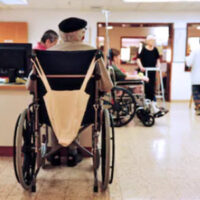Almost 70 Percent of All Rhode Island COVID-19 Deaths Occurred in Nursing Homes: Your Right to Seek Legal Action

As in other areas of the country, the pandemic has taken a toll on Rhode Island nursing homes, where a majority of the state’s deaths have occurred. Specifically, out of a total of 342 deaths in the state of Rhode Island, 220 of them have been nursing home residents, which represents almost 70 percent of the total. This has left the residents, staff and their loved ones extremely concerned that anyone and everyone in a nursing home or assisted living facility is at risk. Questions and concerns also remain as to why the pandemic seems to be spreading and causing devastation so quickly in these facilities.
Many families are also now demanding answers about their loved ones who passed away, especially those who were in good health and first tested negative for the virus, and then suddenly died. Stay-at-home orders (and sometimes the facilities themselves) unfortunately prevented them from visiting for months, as well as saying goodbye, and now the results of second and subsequent COVID-19 tests are unclear and a number of facilities have not been forthcoming with this information. Some have even reported finding out about what happened to their relatives in their final moments not from the facility itself, but from other patients’ families, and reported that facility phones weren’t even answered when they would call to find out how their family members were doing. As a result, nursing homes and assisted living facilities are now facing a wave of coronavirus-related negligence and wrongful death lawsuits around the country, even as they respond with lobbying efforts to obtain emergency protection from negligence claims.
Rhode Island Executive Order: Emergency Declaration – Increasing Hospital & Nursing Facility Capacity, Extending Statutory Immunity
The Governor of Rhode Island signed an Executive Order in April that extends statutory immunity regarding hospital and nursing facility capacity. However, it is very specific as to expanding facility capacity, and in that regard, it only suspends hospital and nursing home facility licensing statutes and rules, including statutes and rules that apply to bed moratoriums, certificates of need, and local authorizations of hospitals or camps for communicable diseases.
As a result, the state has only provided immunity under Rhode Island’s laws and the ability to provide services beyond or without a license to the following:
- All people and organizations subject to the order, including healthcare workers providing community-based healthcare, services at existing and surge hospitals, nursing facilities and alternatives. *However, note that nothing in the Order provides immunity for negligence that occurs in the course of providing patient care to patients without COVID-19 whose care has not been altered by the disaster emergency*
- Any landlords and their contractors, employees, and management companies making these alternative nursing care and surge hospital locations available to Rhode Island
Suing for Negligence & Wrongful Death in Rhode Island Still Possible
It is important for citizens to keep in mind that facilities cannot get away with anything simply because of the pandemic: Flouting federal guidelines, cutting off visitations, failing to inform residents and relatives of an outbreak, disregarding test results, etc. can all result in litigation. Under the law, exemptions like these also never typically apply to instances involving gross negligence and/or willful misconduct, even if they involve COVID-19 patients. The courts will always expect reasonability and common sense measures.
Contact Plaintiffs’ Attorney Michael Kiselica to Find Out More
If you or a loved one has been harmed by negligence, contact Providence personal injury attorney Michael Kiselica at the Kiselica Law Firm. We have a long history of helping families who have been devastated by fatal mistakes.
Resources:
turnto10.com/i-team/66-of-rhode-island-coronavirus-deaths-are-from-nursing-homes
providencejournal.com/news/20200503/faced-with-19000-dead-care-homes-seek-shield-from-lawsuits
